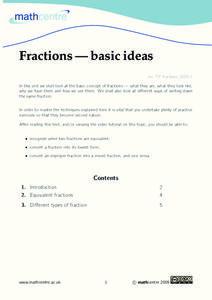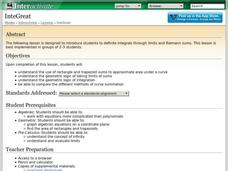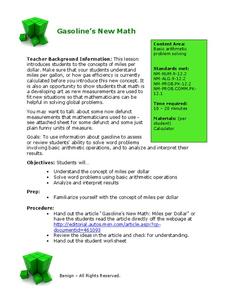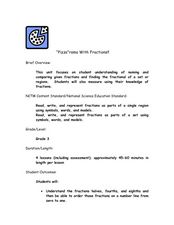National Institute of Open Schooling
Atomic Structure
Learners explain historical findings such as Rutherford and Bohr's contributions, explain wave particle duality, and formulate Heinsenberg's uncertainty principle. They also draw s, p, and d orbitals, explain more historical findings,...
CCSS Math Activities
Smarter Balanced Sample Items: 6th Grade Math – Claim 2
They claim there are problems on the assessment. The presentation provides 13 questions that demonstrate the problem-solving claim for Smarter Balanced assessments. Teachers use the resource to provide examples of problem-solving...
Math Centre UK
Fractions—Basic Ideas
What are fractions? Find out using a reference page and video that goes in depth on how to make fractions equivalent, write fractions in simplest form, convert improper fractions into mixed numbers, and vice versa. Following...
Curated OER
Classify Machines that Fly!
Eighth graders explore flight and the dichotomous key. In this flight lesson, 8th graders gain understanding of the dichotomous key and create one of their own. Students then use their dichotomous key to classify types of aircraft.
Discovery Education
Sonar & Echolocation
A well-designed, comprehensive, and attractive slide show supports direct instruction on how sonar and echolocation work. Contained within the slides are links to interactive websites and instructions for using apps on a mobile device to...
Curated OER
What to Do with Leftovers
Second graders solve real world division story problems using unifix cubes. They read "A Remainder of One" and discuss the concept of remainders. They solve the division problems first with the cubes and then write the problem and answer...
Kentucky School for the Deaf
Levels of Organization within an Ecosystem
From tiny organisms to entire biomes, young scientists examine the interdependent relationships tying all living and non-living things together with this collection of ecology resources.
K12 Reader
Simplifying Fractions
Young mathematicians respond to a series of comprehension questions after reading an article about simplifying fractions.
K12 Reader
Converting Fractions to Decimals
After examining a short article on fractions and decimals, readers draw information for the text to respond to a series of reading comprehension questions.
Busch Gardens
Create an Invertebrate
What better way for young biologists to learn about invertebrates than by creating their very own? Here, students are assigned a set of invertebrate characteristics and are asked to invent an imaginary ocean animal...
Shodor Education Foundation
InteGreat
Hands-on investigation of Riemann sums becomes possible without intensive arithmetic gymnastics with this interactive lesson plan. Learners manipulate online graphing tools to develop and test theories about right, left, and...
Beyond Benign
Got Gas
How much gas does it take to drive around town? The class uses a variety of mathematical procedures to take a look at the use of gas for transportation. Class members use a different unit to determine the cost of driving a car as opposed...
K12 Reader
Oxygen Exchange
An article about the vascular tissues inside plants provides an opportunity to assess reading comprehension. After reading the passage, kids respond to a series of comprehension questions.
Math Mammoth
Recognize Fractions
In this fractions activity, students use the shaded figures and write fractions based on the shaded area to the whole area. Students also learn how to draw pie models. Students divide the circle into fractions and color the right amount...
Math Mammoth
Scales Problems
In this scales worksheet, students use addition, multiplication, and division to find out how much the shapes on the scales weigh. Students complete 8 problems total.
Curated OER
"Pizza"rama With Fractions!!
Young mathematicians explore number values by utilizing food as a visual aide. They discuss the differences between halves, fourths, and eighths and how they are visually represented by a pizza. Then create their own pizza in class and...
Curated OER
Stem Cell Development
Like a fresh canvas, stem cells can turn into almost anything. In a comprehensive lesson, high school biologists use clay to build a 3-D model of cell division and the processes that occur during the first 14 days of development. Also...
Curated OER
How Volcanoes Grow
Students build models of the three major types of volcanoes and see how a volcano's shape is related to the type of material it erupts. As a class, they observe a demonstration that simulates the nature of two volcanic materials: lava...
Curated OER
Plagiarism
Don't get caught plagiarizing! Before starting your research unit, use this lesson to help your young writers identify plagiarism. The truth is, many kids don't even realize when they're doing it! They practice citing sources when...
Curated OER
How Volcanoes Grow
Students create models of the three major types of volcanoes and determine how a volcano's shape is related to the type of material erupted. They then observe a demonstration that simulates the nature of two volcanic materials: lava and...
Curated OER
Sharing Brownies: Fractions That Represent a Fair Share
Elementary graders discover the concept of fractional pieces of a whole. They investigate the meanings of fractions in everyday life and why they are used. Pupils divide brownies amongst each other to demonstrate the use of fractions...
Council for the Curriculum, Examinations and Assessment
Managing Influences and Making Decisions
Internal and external factors influence behavior and decision making. The third session in a 10-lesson series focusing on Social, Physical, Emotional, Cognitive and Spiritual (SPECS) health explores the impact of these factors...
Virginia Department of Education
Metamorphic Rocks
Rocks can bend? Pupils investigate how heat and pressure produce metamorphic rocks by modeling them using clay, and then categorize samples based on observable characteristics. The lesson ends with a metamorphic rock identification...
Houghton Mifflin Harcourt
Person to Person: Extra Support Lessons (Theme 4)
Authors use many strategies when writing stories. A series of extra support lessons breaks down those strategies, as well as key grammatical and phonics-based concepts to support struggling learners. The last of three lessons offers...























